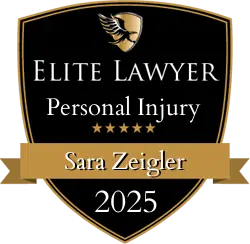Truck rollover accidents, also known as truck tip-overs, are some of the most common types of truck crashes on the road. In the United States, truck rollover accidents account for a significant 35 percent of injuries and fatalities involving transport trucks every year. If you or someone you love has been injured due to a truck rollover, you may be able to file a claim against the liable party.
It is important to know the common causes of these accidents so you can prove that negligence resulted in your injuries. It is also important to know what truck drivers and trucking companies should do to prevent these horrific crashes. Below, our West Virginia truck accident lawyer explains in further detail.
What are Truck Rollover Accidents?
The term ‘truck rollover’ may conjure up images of a truck flipping end-to-end. However, that is not the reality of these crashes. When a truck rolls over, it has usually tipped onto one of its sides or roof, usually as a result of a sudden maneuver or sharp turn. There are many different types of truck rollover accidents, including:
- Truck tip-over accidents
- Truck flip-over accidents
- Turn turn-over accidents
- Truck fall-over accidents
- Crashes with another vehicle
Injuries Caused by Truck Rollover Accidents
Truck rollover accidents are not only very common, but they are also some of the most serious crashes on the road. These crashes often result in wrongful death, but even when they do not, accident victims will suffer some of the most serious injuries. The most common of these include:
- Broken bones
- Spinal cord injuries
- Traumatic brain injuries
- Internal injuries
- Deep lacerations
- Burns
- Whiplash
- Neck injuries
- Head injuries
- Soft tissue injuries
- Crushes limbs
- Severe and large bruises
- Internal bleeding
- Internal organ damage
These injuries are not only very painful, but they are also very expensive to treat. If a truck rolled over and someone else was to blame, you can file a claim against them to recover damages for your injuries and other losses. Before filing a claim against the negligent party, it is important to determine what caused your crash so you can prove your case.
What Causes Truck Rollover Accidents?
Like the majority of crashes involving large commercial vehicles, most truck rollover accidents are completely preventable. In most cases, truck tip-over accidents are caused by someone else’s negligence. The most common causes of these crashes are as follows:
- Speeding: Speeding, particularly on highway exit ramps and around curves, can cause a truck driver to lose control of their vehicle, resulting in a truck rollover accident.
- Distracted driving: When a truck driver is distracted because they are looking at their GPS, their cell phone, or are otherwise distracted, they may have to make sudden steering corrections, which can result in a truck tip-over accident.
- Fatigued driving: Truck drivers who are drowsy or fatigued can impair a trucker’s ability to make quick decisions and properly control their vehicle, which increases the risk of a crash.
- Improper steering: Sudden changes in direction, aggressive steering maneuvers, and overcorrection are just a few types of improper steering that can destabilize a truck and cause a truck rollover accident.
- Improper cargo loading: When cargo is not loaded properly onto a truck, it can shift during transport. This can throw the truck off-balance, making it harder for truckers to control the truck and cause a truck rollover accident.
- Improper truck maintenance: Issues such as defective brakes, under inflated tires, and worn out equipment can make it even harder for a trucker to control their vehicle and increase the risk of a rollover.
- Road conditions: Improper road conditions, such as uneven surfaces, sharp turns, and potholes, can increase the chance of a truck tipping accident.
- Inclement weather: Inclement weather, such as heavy rain, high winds, and snow, can also cause a trucker to lose control of a truck, resulting in a truck rollover accident. While no one can control the weather, truckers must ensure that they have the necessary experience and skill to navigate these conditions or stay off the road.
Why are Truck Rollover Accidents So Dangerous?
Truck rollover accidents are much more dangerous than other types of crashes involving transport trailers on the road. There are many reasons for this, including:
- Extremely forceful impact: Transport trailers weigh approximately 20 to 30 times that of smaller passenger vehicles. During a truck tip-over, the trailer will roll and fall, causing a very forceful impact on anything in its path. Due to the fact that trailers on transport trucks are also much taller than other vehicles, when there is a truck rolled over, it can take up several lanes of traffic, impacting a number of different vehicles and occupants inside of them.
- Spilled cargo: It is not only the actual vehicle that can crash onto the road during truck rollover accidents. The cargo on a truck can also spill out onto the road. This is particularly true when the top or sides of the trailer are not entirely covered.
- Secondary collisions: A truck rolling over can also result in a secondary collision. After the tractor or trailer crashes into other vehicles, it may block other lanes of traffic. Oncoming vehicles may not see the crashed trailer or tractor in time, causing them to crash into the wreckage on the road, causing a secondary collision.
Our Truck Accident Lawyer in West Virginia Can Help After a Crash
Truck drivers and trucking companies are responsible for taking many safety measures to prevent truck rollover accidents. These include ensuring trucks are properly maintained, loaded properly, and more. When they fail to take these measures, they can be held liable for a crash resulting in injuries and losses. At Kaufman & McPherson, our West Virginia truck accident lawyer can determine what caused your crash and which party is liable so you can obtain the full and fair compensation that is justly yours. Reach out to us to schedule a free evaluation of your case with our experienced attorney.










